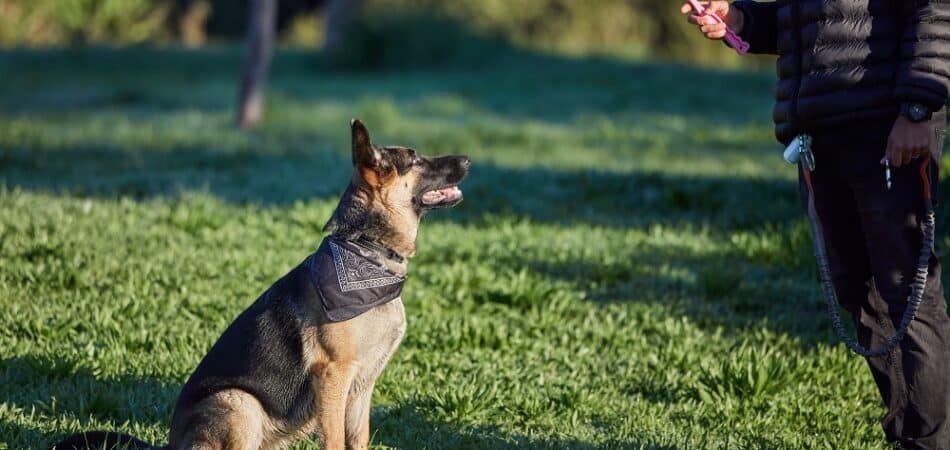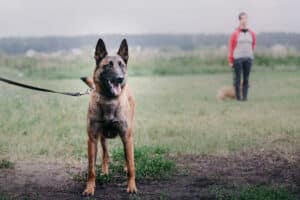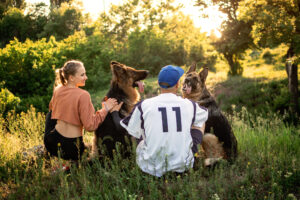






This is a good day. The land stretches wide and silent. No traffic noise, no streetlights flickering, just the rustling of trees and the occasional crack of a branch under some unseen weight.
My coffee has gone cold, but I don’t mind. There’s something about mornings here, the way the sun takes its time rising over the hills, how the fog clings to the ground like it doesn’t want to let go.
This is why we chose this life, miles from the nearest town, far from grocery stores, crowds, and the hum of civilization. It’s peaceful. But peace, as anyone who has lived in isolation knows, is fragile.
Out here, a locked door means little. A 911 call is a hope, not a solution. When you live in a remote or isolated place, security isn’t about waiting for help; it’s about ensuring you don’t need it in the first place.
And this is where protection dogs change everything. These dogs aren’t just a deterrent. They’re a force of nature.
The first time I brought ours home, I knew. His eyes swept the land like he already owned it. He moved with quiet confidence like a predator that didn’t need to prove himself. No wasted motion, no unnecessary noise. Just calm, controlled awareness.
It was clear he wasn’t just any working dog. He was a presence. That first night, I slept differently. Not lighter, not on edge—better. Because for the first time, I knew that if anything or anyone tried to cross into our world uninvited, I wouldn’t be the only one standing in their way.
A protection dog fundamentally shifts the balance of power in remote living. You’re no longer hoping nothing happens; you’re actively preventing it.
But protection is just the beginning. There’s far more to these dogs than just security.
Let’s get into it.
These dogs offer tangible benefits that enhance security and peace of mind in ways other measures can’t.
Beyond this:

Power, Wi-Fi, and cell service. And out here, where a storm can knock out electricity for days and a weak signal is just part of the deal, that kind of dependence is a liability.
A protection dog? He needs none of it: no wires to cut, no batteries to fail, no software to bypass. Just instincts sharpened over generations, training, and an unshakable commitment to the people he protects.
I learned that firsthand one night, hearing a sound in the distance. The dog was up before I could process it, body rigid, ears sharp. He didn’t bark, not yet. That’s what people misunderstand.
A well-trained protection dog doesn’t waste energy on noise. He waits. Assesses the situation. And decides.
So, when my dog finally let out that deep, chest-rattling growl, I knew something was off—we weren’t alone.
And this is what I love about protection dogs. They can sense a threat before you do, reading the wind, a stranger’s body language, and the almost imperceptible shifts in the world around them.
And when the time comes, he acts. Without hesitation. Without fear.
Now, something most people don’t understand: protection dogs are trained to fit into your lifestyle.
And if your trainer didn’t tailor the dog’s training to your environment and daily routines, you’re missing out on the full value of what these animals can offer.
These dogs are conditioned to respect nature’s authority. In rugged terrain, on sandy beaches, or during unpredictable storms, a properly trained protection dog learns and adapts to its surroundings. They become one with the place they protect, integrating into the environment naturally.
Their adaptability isn’t seasonal; it’s instinctive. Through harsh winters, oppressive summer heat, and everything in between, they remain alert, adjusting their behavior without needing constant direction. They don’t work against nature—they work with it.
And this goes beyond the elements. Whether you’re working in the barn, checking the fence line, or making your way through dense woods, your dog is there—reading the environment and staying in sync with you every step.
Out here, you don’t just prepare for intruders; you prepare for everything—wildlife encounters, harsh weather, medical emergencies.
And a well-trained protection dog? He’s a working partner, tuned into the environment, and ready to respond when you need him most.
My dog knows how to keep larger predators at bay—something that matters when a bear wanders too close to the house. This isn’t just a security measure for my family and property; it’s peace of mind when civilization feels distant.
And he’s not alone in this role. In South Africa, livestock farmers lose an estimated R2 billion annually to predators like black-backed jackals, caracals, leopards, and even stray dogs.
The right protection dog can significantly reduce those losses because they’re a proactive deterrent—they prevent the problem rather than merely react to it.
But their skills go beyond that. These dogs can track, locate, and retrieve—whether it’s an object you’ve misplaced or, more critically, livestock that has wandered off or a person who’s lost their way in the woods.
Some protection dogs are even trained to detect medical emergencies, alerting you to seizures or severe allergic reactions before they happen.

There’s a quiet understanding between a person and their dog, something beyond words. He doesn’t ask for explanations. He doesn’t need them.
He just knows—the weight in your voice, the shift in your posture, the way your breath catches when something’s on your mind. He picks up on it all, without judgment, without expectation.
I’ve had conversations with my dog that I wouldn’t have with another human. Not because he understands every word, but because he understands me.
The way I linger at the door after a hard day. The sigh I let out when the world feels heavy. The way my hand rests on his back a second longer when I need grounding.
And in return? He offers something rare: presence. No forced solutions, no empty reassurances, just a steady, unwavering presence. A reminder that, even in the silence, you’re not alone.
You can invest in the best security system money can buy—high-tech cameras, motion sensors, and reinforced doors. You can hire guards, build walls, or fortify every inch of your property. And yet, all of it can fail. Systems can be hacked. Guards can clock out. Walls can be breached.
But a protection dog? His loyalty isn’t for sale. It isn’t based on a paycheck or a line of code. It’s earned—through time, training, shared moments of quiet vigilance, and split-second decisions in high-stakes situations.
He senses tension before you’re even aware of it. He moves with you, scanning not just what’s ahead but what you might have missed.
And when it comes down to it, he won’t hesitate. Because this isn’t just a job for him—it’s his purpose. That kind of loyalty is priceless.
At the end of the day, this is what it’s about—peace of mind. Not living in fear. Not constantly looking over your shoulder. Just being present, fully immersed in the life you chose.
It’s the quiet assurance that no matter how far you are from the nearest town, no matter how unpredictable the wilderness may be, you are not vulnerable. You are protected.
A protection dog isn’t just the last line of defense—though he will be, without hesitation.
He’s a presence that allows you to relax, to walk your land without unease, work from your remote cabin without distraction, and sleep through the night without that nagging sense of vulnerability.
Because out here, solitude is real. Isolation is real. But being alone? That’s something else entirely.
And so, as I sit with my cold coffee, my dog stretches out beside me—half-asleep, but never unaware. The wind shifts. His ears flick. His head lifts just for a second. Then, satisfied, he settles again.
We are home. And we are safe.
Not just any dog will do. When I talk about protection dogs, I mean an elite asset—an animal with the genetics, temperament, training, and handler bond that transforms it into a force multiplier for your security.
Breeds like the Belgian Malinois, German Shepherd, Rottweiler, and Doberman are top choices for a reason. They possess all the characteristics necessary for serious protection work.
But here’s the million-dollar insight most people miss: the breed is maybe 30% of the equation. The training system is everything.
An elite protection dog doesn’t rely on raw aggression—that’s amateur hour. They operate on absolute control and precision. They execute exactly when needed, applying only the necessary force and stopping the instant the threat is neutralized.
That kind of performance isn’t instinct—it’s the result of deliberate, high-level training over months and even years.
This is why working with reputable trainers isn’t optional—it’s essential. A dog is only as effective as the system that built it.
It’s why I partner exclusively with Vanguard Protection Dogs. When I evaluated them, I focused on one key metric: dogs that perform in real-world conditions—not just in controlled training scenarios, but when it matters.
Their environment-specific training protocol ensures that each dog adapts seamlessly to your environment, routine, and specific security needs.
Plus, their customized matching process ensures you get a dog whose skillset aligns perfectly with your lifestyle.
You don’t have to take my word for it—see for yourself.
Contact Vanguard Protection Dogs today and find the right partner for your security and peace of mind.